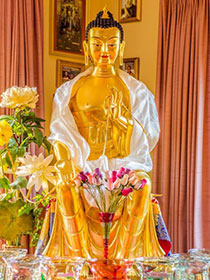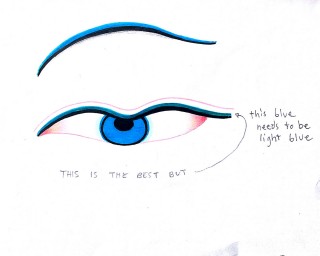- Home
- FPMT Homepage
Foundation for the Preservation of the Mahayana Tradition
The FPMT is an organization devoted to preserving and spreading Mahayana Buddhism worldwide by creating opportunities to listen, reflect, meditate, practice and actualize the unmistaken teachings of the Buddha and based on that experience spreading the Dharma to sentient beings. We provide integrated education through which people’s minds and hearts can be transformed into their highest potential for the benefit of others, inspired by an attitude of universal responsibility and service. We are committed to creating harmonious environments and helping all beings develop their full potential of infinite wisdom and compassion. Our organization is based on the Buddhist tradition of Lama Tsongkhapa of Tibet as taught to us by our founders Lama Thubten Yeshe and Lama Thubten Zopa Rinpoche.
- Willkommen
Die Stiftung zur Erhaltung der Mahayana Tradition (FPMT) ist eine Organisation, die sich weltweit für die Erhaltung und Verbreitung des Mahayana-Buddhismus einsetzt, indem sie Möglichkeiten schafft, den makellosen Lehren des Buddha zuzuhören, über sie zur reflektieren und zu meditieren und auf der Grundlage dieser Erfahrung das Dharma unter den Lebewesen zu verbreiten.
Wir bieten integrierte Schulungswege an, durch denen der Geist und das Herz der Menschen in ihr höchstes Potential verwandelt werden zum Wohl der anderen – inspiriert durch eine Haltung der universellen Verantwortung und dem Wunsch zu dienen. Wir haben uns verpflichtet, harmonische Umgebungen zu schaffen und allen Wesen zu helfen, ihr volles Potenzial unendlicher Weisheit und grenzenlosen Mitgefühls zu verwirklichen.
Unsere Organisation basiert auf der buddhistischen Tradition von Lama Tsongkhapa von Tibet, so wie sie uns von unseren Gründern Lama Thubten Yeshe und Lama Thubten Zopa Rinpoche gelehrt wird.
- Bienvenidos
La Fundación para la preservación de la tradición Mahayana (FPMT) es una organización que se dedica a preservar y difundir el budismo Mahayana en todo el mundo, creando oportunidades para escuchar, reflexionar, meditar, practicar y actualizar las enseñanzas inconfundibles de Buda y en base a esa experiencia difundir el Dharma a los seres.
Proporcionamos una educación integrada a través de la cual las mentes y los corazones de las personas se pueden transformar en su mayor potencial para el beneficio de los demás, inspirados por una actitud de responsabilidad y servicio universales. Estamos comprometidos a crear ambientes armoniosos y ayudar a todos los seres a desarrollar todo su potencial de infinita sabiduría y compasión.
Nuestra organización se basa en la tradición budista de Lama Tsongkhapa del Tíbet como nos lo enseñaron nuestros fundadores Lama Thubten Yeshe y Lama Zopa Rinpoche.
A continuación puede ver una lista de los centros y sus páginas web en su lengua preferida.
- Bienvenue
L’organisation de la FPMT a pour vocation la préservation et la diffusion du bouddhisme du mahayana dans le monde entier. Elle offre l’opportunité d’écouter, de réfléchir, de méditer, de pratiquer et de réaliser les enseignements excellents du Bouddha, pour ensuite transmettre le Dharma à tous les êtres. Nous proposons une formation intégrée grâce à laquelle le cœur et l’esprit de chacun peuvent accomplir leur potentiel le plus élevé pour le bien d’autrui, inspirés par le sens du service et une responsabilité universelle. Nous nous engageons à créer un environnement harmonieux et à aider tous les êtres à épanouir leur potentiel illimité de compassion et de sagesse. Notre organisation s’appuie sur la tradition guéloukpa de Lama Tsongkhapa du Tibet, telle qu’elle a été enseignée par nos fondateurs Lama Thoubtèn Yéshé et Lama Zopa Rinpoché.
Visitez le site de notre Editions Mahayana pour les traductions, conseils et nouvelles du Bureau international en français.
Voici une liste de centres et de leurs sites dans votre langue préférée
- Benvenuto
L’FPMT è un organizzazione il cui scopo è preservare e diffondere il Buddhismo Mahayana nel mondo, creando occasioni di ascolto, riflessione, meditazione e pratica dei perfetti insegnamenti del Buddha, al fine di attualizzare e diffondere il Dharma fra tutti gli esseri senzienti.
Offriamo un’educazione integrata, che può trasformare la mente e i cuori delle persone nel loro massimo potenziale, per il beneficio di tutti gli esseri, ispirati da un’attitudine di responsabilità universale e di servizio.
Il nostro obiettivo è quello di creare contesti armoniosi e aiutare tutti gli esseri a sviluppare in modo completo le proprie potenzialità di infinita saggezza e compassione.
La nostra organizzazione si basa sulla tradizione buddhista di Lama Tsongkhapa del Tibet, così come ci è stata insegnata dai nostri fondatori Lama Thubten Yeshe e Lama Zopa Rinpoche.
Di seguito potete trovare un elenco dei centri e dei loro siti nella lingua da voi prescelta.
- 欢迎 / 歡迎
简体中文
“护持大乘法脉基金会”( 英文简称:FPMT。全名:Foundation for the Preservation of the Mahayana Tradition) 是一个致力于护持和弘扬大乘佛法的国际佛教组织。我们提供听闻,思维,禅修,修行和实证佛陀无误教法的机会,以便让一切众生都能够享受佛法的指引和滋润。
我们全力创造和谐融洽的环境, 为人们提供解行并重的完整佛法教育,以便启发内在的环宇悲心及责任心,并开发内心所蕴藏的巨大潜能 — 无限的智慧与悲心 — 以便利益和服务一切有情。
FPMT的创办人是图腾耶喜喇嘛和喇嘛梭巴仁波切。我们所修习的是由两位上师所教导的,西藏喀巴大师的佛法传承。
繁體中文
護持大乘法脈基金會”( 英文簡稱:FPMT。全名:Found
ation for the Preservation of the Mahayana Tradition ) 是一個致力於護持和弘揚大乘佛法的國際佛教組織。我們提供聽聞, 思維,禪修,修行和實證佛陀無誤教法的機會,以便讓一切眾生都能 夠享受佛法的指引和滋潤。 我們全力創造和諧融洽的環境,
為人們提供解行並重的完整佛法教育,以便啟發內在的環宇悲心及責 任心,並開發內心所蘊藏的巨大潛能 — 無限的智慧與悲心 – – 以便利益和服務一切有情。 FPMT的創辦人是圖騰耶喜喇嘛和喇嘛梭巴仁波切。
我們所修習的是由兩位上師所教導的,西藏喀巴大師的佛法傳承。 察看道场信息:
- FPMT Homepage
- News/Media
-
- Study & Practice
-
-
- About FPMT Education Services
- Latest News
- Programs
- New to Buddhism?
- Buddhist Mind Science: Activating Your Potential
- Heart Advice for Death and Dying
- Discovering Buddhism
- Living in the Path
- Exploring Buddhism
- FPMT Basic Program
- FPMT Masters Program
- FPMT In-Depth Meditation Training
- Maitripa College
- Lotsawa Rinchen Zangpo Translator Program
- Universal Education for Compassion & Wisdom
- Online Learning Center
-
- Prayers & Practice Materials
- Overview of Prayers & Practices
- Full Catalogue of Prayers & Practice Materials
- Explore Popular Topics
- Benefiting Animals
- Chenrezig Resources
- Death & Dying Resources
- Lama Chopa (Guru Puja)
- Lama Zopa Rinpoche: Compendium of Precious Instructions
- Lama Zopa Rinpoche: Life Practice Advice
- Lama Zopa Rinpoche Practice Series
- Lamrim Resources
- Mantras
- Prayer Book Updates
- Purification Practices
- Sutras
- Thought Transformation (Lojong)
- Audio Materials
- Dharma Dates - Tibetan Calendar
- Translation Services
- Publishing Services
- Ways to Offer Support
- Prayers & Practice Materials
-
- Teachings and Advice
- Find Teachings and Advice
- Lama Zopa Rinpoche Advice Page
- Lama Zopa Rinpoche: Compendium of Precious Instructions
- Lama Zopa Rinpoche Video Teachings
- ༧སྐྱབས་རྗེ་བཟོད་པ་རིན་པོ་ཆེ་མཆོག་ནས་སྩལ་བའི་བཀའ་སློབ་བརྙན་འཕྲིན།
- Podcasts
- Lama Yeshe Wisdom Archive
- Buddhism FAQ
- Dharma for Young People
- Resources on Holy Objects
- Teachings and Advice
-
-
*If a menu item has a submenu clicking once will expand the menu clicking twice will open the page.
-
-
- Centers
-
- Teachers
-
- Projects
-
-
-
-
*If a menu item has a submenu clicking once will expand the menu clicking twice will open the page.
-
-
- FPMT
-
- Shop
-
-
-
The Foundation Store is FPMT’s online shop and features a vast selection of Buddhist study and practice materials written or recommended by our lineage gurus. These items include homestudy programs, prayers and practices in PDF or eBook format, materials for children, and other resources to support practitioners.
Items displayed in the shop are made available for Dharma practice and educational purposes, and never for the purpose of profiting from their sale. Please read FPMT Foundation Store Policy Regarding Dharma Items for more information.
-
-
21
Amitabha Buddha Celebrated at Buddha Amitabha Pure Land [Part 1]
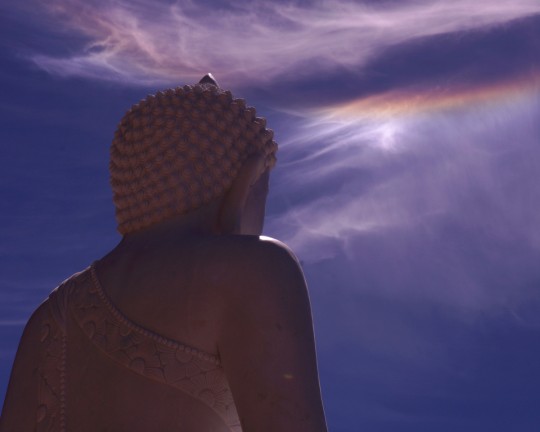
Parhelia appear in the sky above the newly situated Amitabha Buddha statue, Buddha Amitabha Pure Land, Washington, US, July 1, 2014. Photo by Merry Colony.
By Ven. Holly Ansett
A solid white marble Amitabha Buddha statue arrived at Buddha Amitabha Pure Land (BAPL) in Washington State on June 30, 2014. Resident Sangha and students from nearby Pamtingpa Center welcomed the statue with incense and blowing conches, leading the large truck hauling the statue still in its shipping container onto the land. Lama Zopa Rinpoche instructed that those in the procession should think that they are welcoming the Buddha himself to the land.
The following day, the 16 ton (14,790 kilogram) statue and its marble lotus throne were lifted by a crane onto a filled throne base created by Ven. Gyaltan Yarphel [John Jackson]. Rainbows appeared in the sky once the 13-foot (4-meter) statue was situated, culminating a two-year process. Once the statue was placed, local students did extensive prayers, the seven limbs with extensive offering practice and recited the beautiful “Praise to Amitabha” by Lama Tsongkhapa.
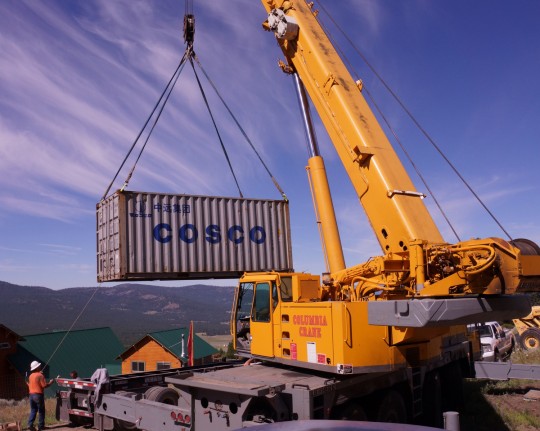
A crane lifts the container that holds the Amitabha Buddha statue, Buddha Amitabha Pure Land, Washington, US, July 1, 2014. Photo by Merry Colony.
Lama Zopa Rinpoche had been involved with every step of the creation of the statue, including the details of the carving, which was done in Vietnam. Rinpoche sent drawn suggestions to the artists with explanations. Last year, a typhoon hit the location where the statue was carved and ended up delaying its arrival in the United States by a year.
Rinpoche Arrives
The first thing Rinpoche did upon his arrival at Buddha Amitabha Pure Land on July 22, 2014, was to go see the new Amitabha statue. Rinpoche immediately led a long extensive offering practice in which he offered all the water bowls and flowers at the house at BAPL, as well as at Kachoe Dechen Ling in California and at all of the FPMT centers, projects and services around the world, and then recited the “Praise to Amitabha” by Lama Tsongkhapa.
Rinpoche saw that there were still some details on the statue that needed to be adjusted, which he noted for Gelek Sherpa, a master artist resident at Land of Medicine Buddha in California and a former monk from Kopan Monastery, who would soon be arriving to paint the statue and throne.
Locals heard about the statue and asked whether they could visit it.
The large statue sits on a hill behind Rinpoche’s house and overlooks the valley. Except for when Rinpoche was in strict retreat, Rinpoche visited the statue every single day during his stay at BAPL in July and August. Every time he went up to the statue, which for Rinpoche is about a 10-15 minute walk, Rinpoche first would check whether there were any ants on the road to the statue and carefully moved them to the side. Rinpoche would lead an extensive offering practice, often with a recording of a gyaling playing throughout and then chant the “Praise to Amitabha” by Lama Tsongkhapa and the prayer to be reborn in the blissful realm of Sukhavati, Amitabha’s pure land.
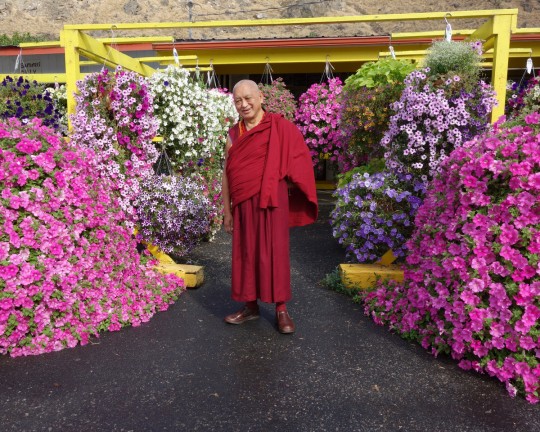
After arriving in Washington, Lama Zopa Rinpoche shopped for extensive flower offerings for the new Amitabha Buddha statue, driving as far as two hours away looking for flowers, US, July 2014. Photo by Ven. Roger Kunsang.
Flower Offerings
Two days after arriving, Rinpoche wanted to go to town to personally pick out flower offerings. Rinpoche took the utmost care picking out the exact kinds of potted flowers for their color and size. He nearly bought out all the flowers in the local town. Ven. Yarphel spent each day transplanting the flowers into bigger pots or digging holes and planting them in the ground. Ven. Tharchin watered them each day, sometimes twice a day as there happened to be in a heat wave with temperatures in the high 90s, which is about 35°C.
The following day, Rinpoche wanted to drive two hours away to find other nurseries with different flowers. Unfortunately, there are not too many to choose from in the area, but we discovered by accident an incredible flower shop on the side of the road. Rinpoche bought about six giant containers of flowers. We had to come a second time to pick everything up with a trailer. Throughout the visit there were many more trips to flower shops to get certain colors or sized flowers and each time they were brought to the statue, Rinpoche would lead an extensive offering practice. Usually, these happened at night by flashlight. And at the end, a thermos of tea would be enjoyed in the dark in front of Amitabha Buddha.
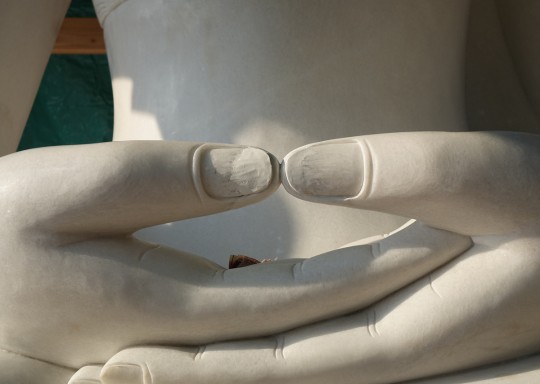
The thumbs of the statue also need to be extended to touch, Buddha Amitabha Pure Land, Washington, US, August 2014. Photo by Ven. Roger Kunsang.
Painting the Statue
The artist Gelek Sherpa arrived from California and immediately started work on the statue. The first thing he did was change the shape of the eyes and then made the statue’s thumbs touch.
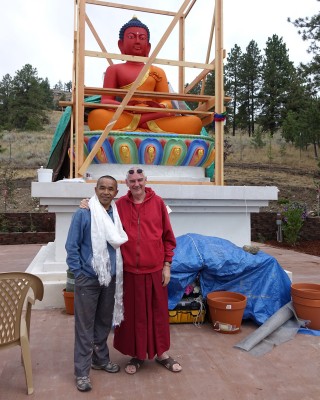
Gelek Sherpa and Ven. Roger Kunsang after opening the buddha statue’s eyes at Buddha Amitabha Pure Land, Washington, US, August 2014. Photo by Ven. Holly Ansett.
Gelek worked extremely quickly, despite the heat. He had about 10 days to paint the statue before the Buddha Amitabha celebration day that was being planned. He mentioned one day that the incredible amount of flowers around the statue attracted many hummingbirds and butterflies, who actually chased the humming birds away! Each day the statue changed. It first became red, then the lotus was painted, and finally, the day before the celebration, the eyes were opened. Rinpoche explained that it’s important to make offerings to the artist the day the eyes are opened on a statue because the artist is creating the cause for us all to create merit. On the day the eyes were opened, Ven. Roger came up with a khata, money offering and coffee for Gelek.
Mandala will publish Part 2 of “Amitabha Buddha Celebrated at Buddha Amitabha Pure Land” later this week.
View more photos from Lama Zopa Rinpoche’s July 2014 visit to Buddha Amitabha Pure Land.
Mandala brings you news of Lama Zopa Rinpoche and of activities, teachings and events from over 160 FPMT centers, projects and services around the globe. If you like what you read on Mandala, consider becoming a Friend of FPMT, which supports our work.
More information, photos and updates about FPMT spiritual director Lama Zopa Rinpoche can be found on Rinpoche’s homepage. If you’d like to receive news of Lama Zopa Rinpoche via email, sign up to Lama Zopa Rinpoche News.
- Home
- News/Media
- Study & Practice
- About FPMT Education Services
- Latest News
- Programs
- New to Buddhism?
- Buddhist Mind Science: Activating Your Potential
- Heart Advice for Death and Dying
- Discovering Buddhism
- Living in the Path
- Exploring Buddhism
- FPMT Basic Program
- FPMT Masters Program
- FPMT In-Depth Meditation Training
- Maitripa College
- Lotsawa Rinchen Zangpo Translator Program
- Universal Education for Compassion & Wisdom
- Online Learning Center
- Prayers & Practice Materials
- Overview of Prayers & Practices
- Full Catalogue of Prayers & Practice Materials
- Explore Popular Topics
- Benefiting Animals
- Chenrezig Resources
- Death & Dying Resources
- Lama Chopa (Guru Puja)
- Lama Zopa Rinpoche: Compendium of Precious Instructions
- Lama Zopa Rinpoche: Life Practice Advice
- Lama Zopa Rinpoche Practice Series
- Lamrim Resources
- Mantras
- Prayer Book Updates
- Purification Practices
- Sutras
- Thought Transformation (Lojong)
- Audio Materials
- Dharma Dates – Tibetan Calendar
- Translation Services
- Publishing Services
- Teachings and Advice
- Find Teachings and Advice
- Lama Zopa Rinpoche Advice Page
- Lama Zopa Rinpoche: Compendium of Precious Instructions
- Lama Zopa Rinpoche Video Teachings
- ༧སྐྱབས་རྗེ་བཟོད་པ་རིན་པོ་ཆེ་མཆོག་ནས་སྩལ་བའི་བཀའ་སློབ་བརྙན་འཕྲིན།
- Podcasts
- Lama Yeshe Wisdom Archive
- Buddhism FAQ
- Dharma for Young People
- Resources on Holy Objects
- Ways to Offer Support
- Centers
- Affiliates Area
- Teachers
- Projects
- Charitable Projects
- Make a Donation
- Applying for Grants
- News about Projects
- Other Projects within FPMT
- Support International Office
- Projects Photo Galleries
- Give Where Most Needed
- FPMT
- Shop
Subscribe to FPMT News
Translate*
*powered by Google TranslateTranslation of pages on fpmt.org is performed by Google Translate, a third party service which FPMT has no control over. The service provides automated computer translations that are only an approximation of the websites' original content. The translations should not be considered exact and only used as a rough guide.You can see that some people’s relationships are reasonable. Therefore, they last a long time. If people’s relationships start off extreme, how can they last? You know from the beginning they cannot last. Balance is so important.







